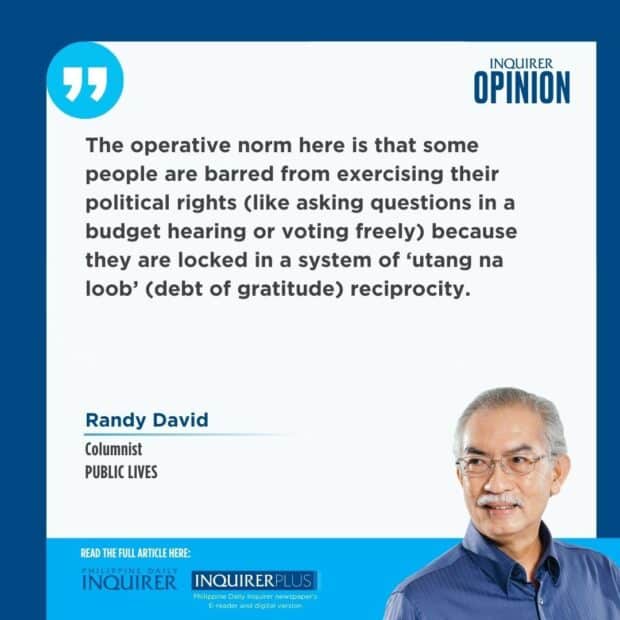A lesson on the politics of ‘utang na loob’

Not a few were startled when Vice President Sara Duterte suddenly accused Sen. Risa Hontiveros of “politicizing” the budget deliberation at the Senate hearing of the Office of the Vice President’s (OVP) 2025 budget. Hontiveros, one of only two opposition senators in the 24-member upper chamber, was asking for clarification of the allocation for certain items in the OVP budget.
I thought every senator in the room was floored by this unexpected reaction. For, what is a budget hearing if not a proper political function of Congress? A budget appropriations bill is precisely subject to scrutiny and debate before it is enacted into law. This is one of the most important acts of Congress, and, rightly, also the most political, as it involves the allocation of public money in accordance with collective priorities.
But quite obviously this is a conception of politics that is not shared by VP Sara. What could she have meant when she charged Risa with unduly “politicizing” the discussion of her office’s budget proposal? It is worth bringing out the tacit assumptions behind VP Sara’s fulmination because they are emblematic of the patronage-driven culture in which our country is hopelessly stuck.
Risa’s intervention focused on two items in the OVP’s budget. The first, which takes up at least half of the more than P2 billion budget, deals with planned expenditures for all kinds of assistance to indigent families—medical, burial, food, aid to disaster victims, etc. Risa had a simple point to make: Since these programs appear to be the principal mandate of government agencies like the social welfare and development department, the local government units, and government hospitals, wouldn’t it be better if the OVP’s assistance programs were aligned with those already managed by the line agencies? The OVP can then reserve a portion of these aligned funds for the exclusive use of her intended beneficiaries—no doubt still a nod to the prerogatives of patronage.
But VP Sara would not be appeased, reiterating that the services she intends to dispense through her own office are at the core of her pledge when she sought election to her current position. In short, from her own view of things, since this allocation is meant for the poor and the needy, it should not be debated further. At the very center of this worldview is the operative misconception of public office as principally a dispenser of material assistance and favors. To be fair, I believe Risa quickly understood where Sara was coming from. She did not pursue the issue any further, except to say that, at the right time, she would move for the realignment of the funds meant for the OVP’s public assistance projects. This did not sit well with the VP, who seemed to expect that parliamentary courtesy should ensure a debate-free unqualified approval of the entirety of her budgetary request. At that point, the Vice President, no doubt feeling entitled to better treatment, thought her unnecessary ordeal before the senators was over. But the irrepressible Hontiveros, the only person in the room who dared to raise any questions about the VP’s budget, shifted her attention to another item in the OVP budget—a P10 million allocation for a children’s book to be distributed to schoolchildren in select areas. The book titled “Isang Kaibigan” (A Friend) is authored by VP Sara herself. “May the Vice President please tell us more about this book? What is it about?” Risa gently probed, almost as an afterthought.
To everyone’s surprise, the VP took the senator’s polite query as nothing less than a frontal assault on her person. The response she unleashed was nothing short of visceral (in the true sense of that word: instinctive and unreasoning). It came in the form of a strident denunciation of the senator’s supposed “politicization” of the hearing, followed by a torrent of allusions about favors asked and granted in the past but never reciprocated, and implied accusations of betrayal and opportunism. “This is an example of politicizing the budget hearing through the questions of a senator. Her problem is my name is listed in the book. And we will be giving that book to the children. And those children have parents who will be voting. And my name will be spread wherever the book is given.”
Visibly stunned, Risa countered: “Madam Chair, I don’t understand the attitude of our resource person. It is just a simple question. But she has repeatedly said that this is ‘politicizing.’ … I did not say anything about voters.”
“I likewise don’t understand the attitude of Senator Risa Hontiveros,” the fuming Sara retorted. She then recalled that in 2016, Risa had sought her help after losing in two previous elections. She said that despite the reluctance of her people, she tried to help her. But after she won, Risa allegedly began attacking her and her father, then President Rodrigo Duterte. The subtext is that Risa is an opportunist and has no business asking questions.
The operative norm here is that some people are barred from exercising their political rights (like asking questions in a budget hearing or voting freely) because they are locked in a system of “utang na loob” (debt of gratitude) reciprocity. Apart from the power of intimidation, this seems to be the only type of politics that politicians like the Dutertes recognize.
public.lives@gmail.com
















